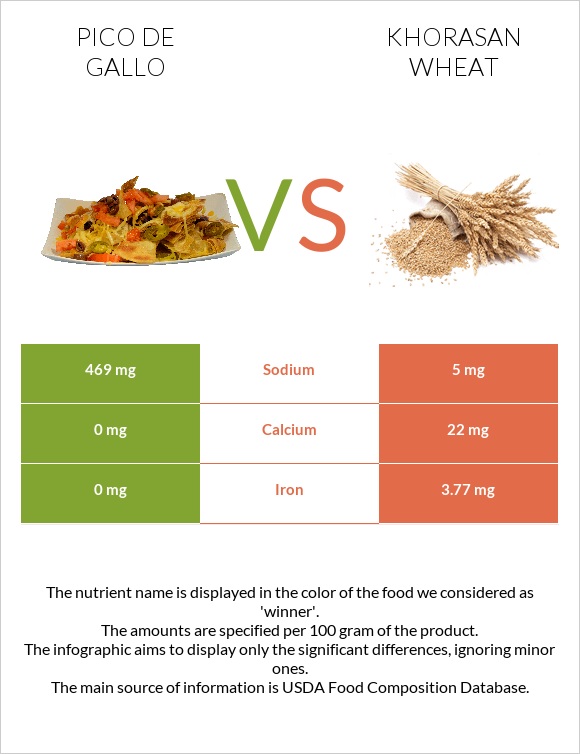Pico de gallo vs. Khorasan wheat — In-Depth Nutrition Comparison
Compare
A recap on the differences between pico de gallo and khorasan wheat
- Pico de gallo is higher in vitamin A, yet khorasan wheat is higher in iron.
- Khorasan wheat covers your daily iron needs 47% more than pico de gallo.
- Pico de gallo contains 94 times more sodium than khorasan wheat. While pico de gallo contains 469mg of sodium, khorasan wheat contains only 5mg.
Food varieties used in this article are PACE, Pico De Gallo and Wheat, KAMUT khorasan, uncooked.
Infographic

Infographic link
Mineral Comparison
Mineral comparison score is based on the number of minerals by which one or the other food is richer. The "coverage" charts below show how much of the daily needs can be covered by 300 grams of the food.
| Contains more CalciumCalcium | +∞% |
| Contains more IronIron | +∞% |
| Contains less SodiumSodium | -98.9% |
Vitamin Comparison
Vitamin comparison score is based on the number of vitamins by which one or the other food is richer. The "coverage" charts below show how much of the daily needs can be covered by 300 grams of the food.
| Contains more Vitamin CVitamin C | +∞% |
All nutrients comparison - raw data values
| Nutrient |  |
 |
DV% diff. |
| Selenium | 81.5µg | 148% | |
| Manganese | 2.735mg | 119% | |
| Copper | 0.506mg | 56% | |
| Phosphorus | 364mg | 52% | |
| Iron | 0mg | 3.77mg | 47% |
| Vitamin B1 | 0.566mg | 47% | |
| Fiber | 11.1g | 44% | |
| Vitamin B3 | 6.375mg | 40% | |
| Zinc | 3.68mg | 33% | |
| Magnesium | 130mg | 31% | |
| Protein | 0g | 14.54g | 29% |
| Starch | 52.41g | 22% | |
| Carbs | 9.38g | 70.58g | 20% |
| Sodium | 469mg | 5mg | 20% |
| Vitamin B6 | 0.259mg | 20% | |
| Vitamin B5 | 0.949mg | 19% | |
| Calories | 31kcal | 337kcal | 15% |
| Vitamin B2 | 0.184mg | 14% | |
| Potassium | 403mg | 12% | |
| Choline | 25.8mg | 5% | |
| Vitamin C | 3.8mg | 0mg | 4% |
| Vitamin E | 0.61mg | 4% | |
| Polyunsaturated fat | 0.621g | 4% | |
| Fats | 0g | 2.13g | 3% |
| Calcium | 0mg | 22mg | 2% |
| Vitamin K | 1.8µg | 2% | |
| Saturated fat | 0g | 0.196g | 1% |
| Monounsaturated fat | 0.213g | 1% | |
| Net carbs | 9.38g | 59.48g | N/A |
| Sugar | 6.25g | 7.84g | N/A |
| Vitamin A | 1µg | 0% | |
| Trans fat | 0.005g | N/A | |
| Tryptophan | 0.13mg | 0% | |
| Threonine | 0.442mg | 0% | |
| Isoleucine | 0.566mg | 0% | |
| Leucine | 1.112mg | 0% | |
| Lysine | 0.416mg | 0% | |
| Methionine | 0.251mg | 0% | |
| Phenylalanine | 0.772mg | 0% | |
| Valine | 0.687mg | 0% | |
| Histidine | 0.379mg | 0% | |
| Fructose | 0.11g | 0% | |
| Omega-3 - ALA | 0.048g | N/A |
Macronutrient Comparison
Macronutrient breakdown side-by-side comparison
Protein:
0 g
Fats:
0 g
Carbs:
9.38 g
Water:
88 g
Other:
2.62 g
Protein:
14.54 g
Fats:
2.13 g
Carbs:
70.58 g
Water:
11.07 g
Other:
1.68 g
| Contains more WaterWater | +694.9% |
| Contains more OtherOther | +56% |
| Contains more ProteinProtein | +∞% |
| Contains more FatsFats | +∞% |
| Contains more CarbsCarbs | +652.5% |





